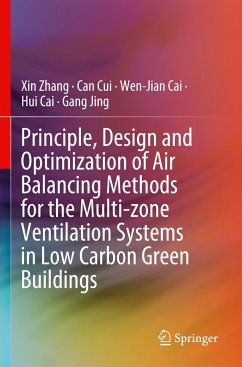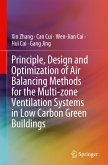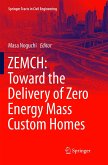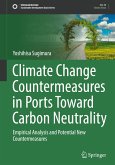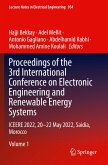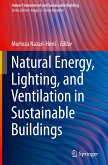Xin Zhang, Can Cui, Wen-Jian Cai
Principle, Design and Optimization of Air Balancing Methods for the Multi-zone Ventilation Systems in Low Carbon Green Buildings
Xin Zhang, Can Cui, Wen-Jian Cai
Principle, Design and Optimization of Air Balancing Methods for the Multi-zone Ventilation Systems in Low Carbon Green Buildings
- Broschiertes Buch
- Merkliste
- Auf die Merkliste
- Bewerten Bewerten
- Teilen
- Produkt teilen
- Produkterinnerung
- Produkterinnerung
This book presents a systematic study on the air balancing technologies in heating, ventilation and air conditioning (HVAC) systems. Several modern air balancing methods, including advanced control-based air balancing, data-driven-based air balancing, and energy-saving-oriented air balancing, are introduced in this book to balance the air duct system. Furthermore, this book provides clear instructions for both HVAC designers and engineers, as well as researchers, on how to design and balance duct systems for improved performance and energy efficiency.
Andere Kunden interessierten sich auch für
![Principle, Design and Optimization of Air Balancing Methods for the Multi-zone Ventilation Systems in Low Carbon Green Buildings Principle, Design and Optimization of Air Balancing Methods for the Multi-zone Ventilation Systems in Low Carbon Green Buildings]() Xin ZhangPrinciple, Design and Optimization of Air Balancing Methods for the Multi-zone Ventilation Systems in Low Carbon Green Buildings74,99 €
Xin ZhangPrinciple, Design and Optimization of Air Balancing Methods for the Multi-zone Ventilation Systems in Low Carbon Green Buildings74,99 €![ZEMCH: Toward the Delivery of Zero Energy Mass Custom Homes ZEMCH: Toward the Delivery of Zero Energy Mass Custom Homes]() ZEMCH: Toward the Delivery of Zero Energy Mass Custom Homes74,99 €
ZEMCH: Toward the Delivery of Zero Energy Mass Custom Homes74,99 €![Climate Change Countermeasures in Ports Toward Carbon Neutrality Climate Change Countermeasures in Ports Toward Carbon Neutrality]() Yoshihisa SugimuraClimate Change Countermeasures in Ports Toward Carbon Neutrality110,99 €
Yoshihisa SugimuraClimate Change Countermeasures in Ports Toward Carbon Neutrality110,99 €![Performance Investigation of Air Source Heat Pump Water Heater Performance Investigation of Air Source Heat Pump Water Heater]() Venkatesh T. LamaniPerformance Investigation of Air Source Heat Pump Water Heater29,99 €
Venkatesh T. LamaniPerformance Investigation of Air Source Heat Pump Water Heater29,99 €![Proceedings of the 3rd International Conference on Electronic Engineering and Renewable Energy Systems Proceedings of the 3rd International Conference on Electronic Engineering and Renewable Energy Systems]() Proceedings of the 3rd International Conference on Electronic Engineering and Renewable Energy Systems254,99 €
Proceedings of the 3rd International Conference on Electronic Engineering and Renewable Energy Systems254,99 €![Natural Energy, Lighting, and Ventilation in Sustainable Buildings Natural Energy, Lighting, and Ventilation in Sustainable Buildings]() Natural Energy, Lighting, and Ventilation in Sustainable Buildings95,99 €
Natural Energy, Lighting, and Ventilation in Sustainable Buildings95,99 €![Energy Efficiency, Which Way to Go Energy Efficiency, Which Way to Go]() Ali Ben AOUIENEEnergy Efficiency, Which Way to Go26,99 €
Ali Ben AOUIENEEnergy Efficiency, Which Way to Go26,99 €-
-
-
This book presents a systematic study on the air balancing technologies in heating, ventilation and air conditioning (HVAC) systems. Several modern air balancing methods, including advanced control-based air balancing, data-driven-based air balancing, and energy-saving-oriented air balancing, are introduced in this book to balance the air duct system. Furthermore, this book provides clear instructions for both HVAC designers and engineers, as well as researchers, on how to design and balance duct systems for improved performance and energy efficiency.
Produktdetails
- Produktdetails
- Verlag: Springer / Springer Nature Singapore / Springer, Berlin
- Artikelnr. des Verlages: 978-981-19-7093-1
- 1st ed. 2023
- Seitenzahl: 172
- Erscheinungstermin: 20. Oktober 2023
- Englisch
- Abmessung: 235mm x 155mm x 10mm
- Gewicht: 328g
- ISBN-13: 9789811970931
- ISBN-10: 9811970939
- Artikelnr.: 69026465
- Verlag: Springer / Springer Nature Singapore / Springer, Berlin
- Artikelnr. des Verlages: 978-981-19-7093-1
- 1st ed. 2023
- Seitenzahl: 172
- Erscheinungstermin: 20. Oktober 2023
- Englisch
- Abmessung: 235mm x 155mm x 10mm
- Gewicht: 328g
- ISBN-13: 9789811970931
- ISBN-10: 9811970939
- Artikelnr.: 69026465
Xin Zhang received the Ph.D. degree in Automatic Control and Systems Engineering from the University of Sheffield, U.K., in 2016 and the Ph.D. degree in Electronic and Electrical Engineering from Nanjing University of Aeronautics and Astronautics, China, in 2014. From February 2014 to December 2016, he was Research Associate with the University of Sheffield. From January 2017 to September 2017, he was Postdoctoral Research Fellow at the City University of Hong Kong. From September 2017 to August 2020, he was Assistant Professor of Power Engineering with the School of Electrical and Electronic Engineering, Nanyang Technological University, Singapore. Currently, he is Full Professor at Zhejiang University. He is generally interested in power electronics, power systems, and advanced control theory, together with their applications in various sectors. He has received the Highly Prestigious Chinese National Award for Outstanding Students Aboard in 2016. He is Associate Editor of 8 SCIjournals and transactions, such as IEEE TIE/JESTPE/OJPE Access and IET Power Electronics. Cui Can received bachelor's degree in Control Science and Engineering (Automation) from Shandong University, China, in 2014, and Ph.D. degree in Electrical and Electronic Engineering from Nanyang Technological University, Singapore, in 2019. She was Research Fellow at the Energy Research Institute @NTU from 2019 to 2020. Currently, she is Associate Professor at Ocean University of China. She is interested in advanced control, data-driven technology and the air balancing control in HVAC system. Prof Cai Wenjian is currently in the School of EEE, Nanyang Technological University, since 1999. He received his B. Eng., M. Eng., and Ph.D. from the Department of Precision Instrumentation Engineering, Department of Control Engineering, Harbin Institute of Technology, P. R. China, and Department of Electrical Engineering, Oakland University, U. S. A.,in 1980, 1983 and 1992, respectively. He has more than twenty years of industry and research experience in the areas of mechanical design, system modelling and simulation, energy and environmental system automation and process control. He participated in many industry-related research projects and published more than one hundred technical papers, three books, two patents and received three national awards. He has been often invited as a technical committee member or referee and reviewer for a number of premier conferences and journals, including Journal of Process Control, Energy and Management, etc. He is Member of IEEE. Cai Hui received the B.S.E.E. and Ph.D. degrees from Zhejiang University, Hangzhou, China, in 2002 and 2008, respectively. He is Full Professor at the College of Mechanical and Electrical Engineering of China Jiliang University, Hangzhou, China. Currently, he is Visiting Research Fellow at the School of Electrical and Electronic Engineering of Nanyang Technological University. His current research interests include power converter systems, new energy power generation, electrical parameters measurement and big data analysis, advanced control theory. Jing Gang received bachelor's degree in Electrical and Electronic Engineering from Harbin University of Science and Technology, Harbin, China, in 2000, and Ph.D. degree in Control Science and Engineering from Shandong University, Jinan, China, in 2013. Currently, he works as Lecturer at Shandong Jiaotong University. He is interested in zero energy building.
1. Introduction of the Air Balancing Technology
1.1 Background
1.1.1 Overview of HVAC systems
1.1.2 Overview of air duct systems
1.2 Basic knowledge of the air balancing
1.2.1 Mathematical modeling of the air duct system
1.2.2 Theoretical analysis on energy consumption in air duct systems caused by over ventilation
1.2.3 The concept and basic knowledge of the air balancing
1.2.4 Benefits of the air balancing
1.3 Implementation of the air balancing
1.3.1 Principles of the air balancing
1.3.2 Traditional air balancing procedure
1.3.3 The existing air balancing methods
1.4 Organization of this book
2. A Hierarchical Air Balancing Method via PID Control
2.1 Introduction
2.2 The Proposed hierarchical control structure for the VAV system
2.2.1 Description of the test bed
2.2.2 The proposed hierarchical control structure
2.3 The proposed PID control strategy of the fan-duct system
2.3.1 Transfer function of the fan-duct system
2.3.2 Open loop step test with two points method
2.3.3 PID parameter estimation method based on the gain and phase margin method
2.4 The proposed PID controller of the damper in the duct system
2.4.1 Characteristic of the damper
2.4.2 Transfer function modelling of the damper
2.4.3 PID parameter estimation method
2.5 Experimental results
2.5.1 Experiments of the PID control of the fan-duct system
2.5.2 Experiments of the PID controller of the damper
2.5.3 Experiments of the dual loop PID strategy for the duct system
2.6 Conclusion
3. A gradient-based online adaptive air balancing method
3.1 Introduction
3.2 The proposed gradient-based online adaptive air balancing method
3.2.1 Objective of the proposed gradient-based online adaptive air balancing method
3.2.2 Refinement of damper adjustment with consideration of energy conservation
3.2.3 Estimation of Jacobian matrix and online adaptation
3.2.4 Low-pass filter trick
3.2.5 Final form of the proposed gradient-based online adaptive air balancing method
3.3 Design principle of the proposed gradient-based online adaptive air balancing method
3.3.1 Base case of the gradient-based online adaptive air balancing method
3.3.2 Investigation into the initial damper angle tho
3.3.3 Investigation into the refinement coefficient
3.3.4 Investigation into the step size
3.4 Experimental validation
3.4.1 Experimental platform and procedures
3.4.2 Validation of the proposed gradient-based online adaptive air balancing method on the test platform
3.5 Conclusion
4. A Distributed Cooperative Control-based Air Balancing Method
4.1 Introduction
4.2 Theory of the proposed distributed cooperative control-based air balancing method
4.2.1 Concept of distributed cooperative control: consensus algorithm
4.3.2 The proposed distributed cooperative control-based air balancing method
4.3 Design principle of the proposed distributed cooperative control-based air balancing method
4.3.1 beta = 0, equal q*
4.3.2 beta 0, equal q*
4.3.3 beta 0, different q*
4.3.4 beta 0, different Ts
4.4 Experimental Validation
4.4.1 Experimental platform and experimental procedures
4.4.2 Validation of the proposed distributed cooperative control-based air balancing method on the test platform
4.5 Conclusion
5. An air balancing method using support vector machine
5.1 Introduction
5.2 Physical-based system model of the duct system
5.2.1 Component model of the duct system
5.2.2 Definition of the physical-based system model
5.2.3 Computational model for duct system
5.3 The proposed physical model-based air balancing procedure
5.3.1 Parameter identification of the physical model of the duct system
5.3.2 Damper position determination
5.4 Data collection procedure for the proposed air balancing method
5.5 Experiments validation
5.5.1 Data sampling and pre-processing
5.5.2 Parameter characteristics of SVM
5.5.3 Results of parameter identification
5.5.4 Results of damper position determination
5.5.5 Results of maximum absolute percentage error (MAPE)
5.6 Conclusion
6. An Air Balancing Method using Multi-layer Feed Forward Network
6.1 Introduction
6.2 Overview of the air balancing based energy saving control strategy
6.3 MLFFN based energy saving model of the ventilation system
6.3.1 Experimental apparatus and data collection
6.3.1.1 Experimental apparatus
6.3.1.2 Data collection
6.3.2 MLFFN based energy saving model construction
6.3.3 MLFFN based energy saving model validation
6.3.4 Analysis of energy saving ways
6.4 The proposed air balancing control with the MLFFN based energy saving model
6.5 Experimental validation
6.5.1 Command following test
6.5.2 Energy saving potential
6.6 Conclusion
7. An Air Balancing Method by a Full Data-Driven Duct System Model
7.1 Introduction
7.2 Problem description
7.2.1 Review of model-based air balancing methods
7.2.2 Problems of the existing model-based air balancing methods: ASHRAE damper model can be inaccurate in practice
7.2.3 Possible solution: bypassing the ASHRAE damper model and constructing a Full Data-Driven Duct System (FD3S) model to predict the damper angle with terminal flow directly
7.3 Proposed FD3S model-based air balancing method
7.3.1 Concept of the proposed FD3S model-based air balancing method
7.3.2 Proposed FD3S model-based air balancing method
7.3.3 Advantages of the proposed energy-saving oriented air balancing method
7.4 Experimental validation
7.4.1 Practical considerations in the experiment
7.4.2 Verification of the proposed full data-driven duct system mode
7.4.3 Verification of the air balancing ability on the test system
7.5 Conclusion
8 An Air Balancing with Optimal Pressure Set-point for Minimized Energy Consumption
8.1 Introduction
8.2 Energy-saving-oriented (ESO) model of ventilation systems
8.2.1 Definitions for ESO modeling the ventilation system
8.2.2 ESO model of the ventilation system
8.2.3 Parameter identification for the developed ESO model
8.3 Damper position control method to achieve air balancing
8.4 Optimal static pressure set-point selection to minimize energy consumption of ventilation system
8.5 Operating steps for improved SPR control strategy
8.6 Experimental apparatus
8.7 Experimental validation
8.7.1 Parameter selection for SVM regression machine learning algorithm
8.7.2 Parameter identification for the developed model of the ventilation system
8.7.3 Validation of relative error of airflow rate
8.7.4 Validation through use of maximum absolute percentage error
8.7.5 Energy-saving potential
8.8 Conclusion
1.1 Background
1.1.1 Overview of HVAC systems
1.1.2 Overview of air duct systems
1.2 Basic knowledge of the air balancing
1.2.1 Mathematical modeling of the air duct system
1.2.2 Theoretical analysis on energy consumption in air duct systems caused by over ventilation
1.2.3 The concept and basic knowledge of the air balancing
1.2.4 Benefits of the air balancing
1.3 Implementation of the air balancing
1.3.1 Principles of the air balancing
1.3.2 Traditional air balancing procedure
1.3.3 The existing air balancing methods
1.4 Organization of this book
2. A Hierarchical Air Balancing Method via PID Control
2.1 Introduction
2.2 The Proposed hierarchical control structure for the VAV system
2.2.1 Description of the test bed
2.2.2 The proposed hierarchical control structure
2.3 The proposed PID control strategy of the fan-duct system
2.3.1 Transfer function of the fan-duct system
2.3.2 Open loop step test with two points method
2.3.3 PID parameter estimation method based on the gain and phase margin method
2.4 The proposed PID controller of the damper in the duct system
2.4.1 Characteristic of the damper
2.4.2 Transfer function modelling of the damper
2.4.3 PID parameter estimation method
2.5 Experimental results
2.5.1 Experiments of the PID control of the fan-duct system
2.5.2 Experiments of the PID controller of the damper
2.5.3 Experiments of the dual loop PID strategy for the duct system
2.6 Conclusion
3. A gradient-based online adaptive air balancing method
3.1 Introduction
3.2 The proposed gradient-based online adaptive air balancing method
3.2.1 Objective of the proposed gradient-based online adaptive air balancing method
3.2.2 Refinement of damper adjustment with consideration of energy conservation
3.2.3 Estimation of Jacobian matrix and online adaptation
3.2.4 Low-pass filter trick
3.2.5 Final form of the proposed gradient-based online adaptive air balancing method
3.3 Design principle of the proposed gradient-based online adaptive air balancing method
3.3.1 Base case of the gradient-based online adaptive air balancing method
3.3.2 Investigation into the initial damper angle tho
3.3.3 Investigation into the refinement coefficient
3.3.4 Investigation into the step size
3.4 Experimental validation
3.4.1 Experimental platform and procedures
3.4.2 Validation of the proposed gradient-based online adaptive air balancing method on the test platform
3.5 Conclusion
4. A Distributed Cooperative Control-based Air Balancing Method
4.1 Introduction
4.2 Theory of the proposed distributed cooperative control-based air balancing method
4.2.1 Concept of distributed cooperative control: consensus algorithm
4.3.2 The proposed distributed cooperative control-based air balancing method
4.3 Design principle of the proposed distributed cooperative control-based air balancing method
4.3.1 beta = 0, equal q*
4.3.2 beta 0, equal q*
4.3.3 beta 0, different q*
4.3.4 beta 0, different Ts
4.4 Experimental Validation
4.4.1 Experimental platform and experimental procedures
4.4.2 Validation of the proposed distributed cooperative control-based air balancing method on the test platform
4.5 Conclusion
5. An air balancing method using support vector machine
5.1 Introduction
5.2 Physical-based system model of the duct system
5.2.1 Component model of the duct system
5.2.2 Definition of the physical-based system model
5.2.3 Computational model for duct system
5.3 The proposed physical model-based air balancing procedure
5.3.1 Parameter identification of the physical model of the duct system
5.3.2 Damper position determination
5.4 Data collection procedure for the proposed air balancing method
5.5 Experiments validation
5.5.1 Data sampling and pre-processing
5.5.2 Parameter characteristics of SVM
5.5.3 Results of parameter identification
5.5.4 Results of damper position determination
5.5.5 Results of maximum absolute percentage error (MAPE)
5.6 Conclusion
6. An Air Balancing Method using Multi-layer Feed Forward Network
6.1 Introduction
6.2 Overview of the air balancing based energy saving control strategy
6.3 MLFFN based energy saving model of the ventilation system
6.3.1 Experimental apparatus and data collection
6.3.1.1 Experimental apparatus
6.3.1.2 Data collection
6.3.2 MLFFN based energy saving model construction
6.3.3 MLFFN based energy saving model validation
6.3.4 Analysis of energy saving ways
6.4 The proposed air balancing control with the MLFFN based energy saving model
6.5 Experimental validation
6.5.1 Command following test
6.5.2 Energy saving potential
6.6 Conclusion
7. An Air Balancing Method by a Full Data-Driven Duct System Model
7.1 Introduction
7.2 Problem description
7.2.1 Review of model-based air balancing methods
7.2.2 Problems of the existing model-based air balancing methods: ASHRAE damper model can be inaccurate in practice
7.2.3 Possible solution: bypassing the ASHRAE damper model and constructing a Full Data-Driven Duct System (FD3S) model to predict the damper angle with terminal flow directly
7.3 Proposed FD3S model-based air balancing method
7.3.1 Concept of the proposed FD3S model-based air balancing method
7.3.2 Proposed FD3S model-based air balancing method
7.3.3 Advantages of the proposed energy-saving oriented air balancing method
7.4 Experimental validation
7.4.1 Practical considerations in the experiment
7.4.2 Verification of the proposed full data-driven duct system mode
7.4.3 Verification of the air balancing ability on the test system
7.5 Conclusion
8 An Air Balancing with Optimal Pressure Set-point for Minimized Energy Consumption
8.1 Introduction
8.2 Energy-saving-oriented (ESO) model of ventilation systems
8.2.1 Definitions for ESO modeling the ventilation system
8.2.2 ESO model of the ventilation system
8.2.3 Parameter identification for the developed ESO model
8.3 Damper position control method to achieve air balancing
8.4 Optimal static pressure set-point selection to minimize energy consumption of ventilation system
8.5 Operating steps for improved SPR control strategy
8.6 Experimental apparatus
8.7 Experimental validation
8.7.1 Parameter selection for SVM regression machine learning algorithm
8.7.2 Parameter identification for the developed model of the ventilation system
8.7.3 Validation of relative error of airflow rate
8.7.4 Validation through use of maximum absolute percentage error
8.7.5 Energy-saving potential
8.8 Conclusion
1. Introduction of the Air Balancing Technology
1.1 Background
1.1.1 Overview of HVAC systems
1.1.2 Overview of air duct systems
1.2 Basic knowledge of the air balancing
1.2.1 Mathematical modeling of the air duct system
1.2.2 Theoretical analysis on energy consumption in air duct systems caused by over ventilation
1.2.3 The concept and basic knowledge of the air balancing
1.2.4 Benefits of the air balancing
1.3 Implementation of the air balancing
1.3.1 Principles of the air balancing
1.3.2 Traditional air balancing procedure
1.3.3 The existing air balancing methods
1.4 Organization of this book
2. A Hierarchical Air Balancing Method via PID Control
2.1 Introduction
2.2 The Proposed hierarchical control structure for the VAV system
2.2.1 Description of the test bed
2.2.2 The proposed hierarchical control structure
2.3 The proposed PID control strategy of the fan-duct system
2.3.1 Transfer function of the fan-duct system
2.3.2 Open loop step test with two points method
2.3.3 PID parameter estimation method based on the gain and phase margin method
2.4 The proposed PID controller of the damper in the duct system
2.4.1 Characteristic of the damper
2.4.2 Transfer function modelling of the damper
2.4.3 PID parameter estimation method
2.5 Experimental results
2.5.1 Experiments of the PID control of the fan-duct system
2.5.2 Experiments of the PID controller of the damper
2.5.3 Experiments of the dual loop PID strategy for the duct system
2.6 Conclusion
3. A gradient-based online adaptive air balancing method
3.1 Introduction
3.2 The proposed gradient-based online adaptive air balancing method
3.2.1 Objective of the proposed gradient-based online adaptive air balancing method
3.2.2 Refinement of damper adjustment with consideration of energy conservation
3.2.3 Estimation of Jacobian matrix and online adaptation
3.2.4 Low-pass filter trick
3.2.5 Final form of the proposed gradient-based online adaptive air balancing method
3.3 Design principle of the proposed gradient-based online adaptive air balancing method
3.3.1 Base case of the gradient-based online adaptive air balancing method
3.3.2 Investigation into the initial damper angle tho
3.3.3 Investigation into the refinement coefficient
3.3.4 Investigation into the step size
3.4 Experimental validation
3.4.1 Experimental platform and procedures
3.4.2 Validation of the proposed gradient-based online adaptive air balancing method on the test platform
3.5 Conclusion
4. A Distributed Cooperative Control-based Air Balancing Method
4.1 Introduction
4.2 Theory of the proposed distributed cooperative control-based air balancing method
4.2.1 Concept of distributed cooperative control: consensus algorithm
4.3.2 The proposed distributed cooperative control-based air balancing method
4.3 Design principle of the proposed distributed cooperative control-based air balancing method
4.3.1 beta = 0, equal q*
4.3.2 beta 0, equal q*
4.3.3 beta 0, different q*
4.3.4 beta 0, different Ts
4.4 Experimental Validation
4.4.1 Experimental platform and experimental procedures
4.4.2 Validation of the proposed distributed cooperative control-based air balancing method on the test platform
4.5 Conclusion
5. An air balancing method using support vector machine
5.1 Introduction
5.2 Physical-based system model of the duct system
5.2.1 Component model of the duct system
5.2.2 Definition of the physical-based system model
5.2.3 Computational model for duct system
5.3 The proposed physical model-based air balancing procedure
5.3.1 Parameter identification of the physical model of the duct system
5.3.2 Damper position determination
5.4 Data collection procedure for the proposed air balancing method
5.5 Experiments validation
5.5.1 Data sampling and pre-processing
5.5.2 Parameter characteristics of SVM
5.5.3 Results of parameter identification
5.5.4 Results of damper position determination
5.5.5 Results of maximum absolute percentage error (MAPE)
5.6 Conclusion
6. An Air Balancing Method using Multi-layer Feed Forward Network
6.1 Introduction
6.2 Overview of the air balancing based energy saving control strategy
6.3 MLFFN based energy saving model of the ventilation system
6.3.1 Experimental apparatus and data collection
6.3.1.1 Experimental apparatus
6.3.1.2 Data collection
6.3.2 MLFFN based energy saving model construction
6.3.3 MLFFN based energy saving model validation
6.3.4 Analysis of energy saving ways
6.4 The proposed air balancing control with the MLFFN based energy saving model
6.5 Experimental validation
6.5.1 Command following test
6.5.2 Energy saving potential
6.6 Conclusion
7. An Air Balancing Method by a Full Data-Driven Duct System Model
7.1 Introduction
7.2 Problem description
7.2.1 Review of model-based air balancing methods
7.2.2 Problems of the existing model-based air balancing methods: ASHRAE damper model can be inaccurate in practice
7.2.3 Possible solution: bypassing the ASHRAE damper model and constructing a Full Data-Driven Duct System (FD3S) model to predict the damper angle with terminal flow directly
7.3 Proposed FD3S model-based air balancing method
7.3.1 Concept of the proposed FD3S model-based air balancing method
7.3.2 Proposed FD3S model-based air balancing method
7.3.3 Advantages of the proposed energy-saving oriented air balancing method
7.4 Experimental validation
7.4.1 Practical considerations in the experiment
7.4.2 Verification of the proposed full data-driven duct system mode
7.4.3 Verification of the air balancing ability on the test system
7.5 Conclusion
8 An Air Balancing with Optimal Pressure Set-point for Minimized Energy Consumption
8.1 Introduction
8.2 Energy-saving-oriented (ESO) model of ventilation systems
8.2.1 Definitions for ESO modeling the ventilation system
8.2.2 ESO model of the ventilation system
8.2.3 Parameter identification for the developed ESO model
8.3 Damper position control method to achieve air balancing
8.4 Optimal static pressure set-point selection to minimize energy consumption of ventilation system
8.5 Operating steps for improved SPR control strategy
8.6 Experimental apparatus
8.7 Experimental validation
8.7.1 Parameter selection for SVM regression machine learning algorithm
8.7.2 Parameter identification for the developed model of the ventilation system
8.7.3 Validation of relative error of airflow rate
8.7.4 Validation through use of maximum absolute percentage error
8.7.5 Energy-saving potential
8.8 Conclusion
1.1 Background
1.1.1 Overview of HVAC systems
1.1.2 Overview of air duct systems
1.2 Basic knowledge of the air balancing
1.2.1 Mathematical modeling of the air duct system
1.2.2 Theoretical analysis on energy consumption in air duct systems caused by over ventilation
1.2.3 The concept and basic knowledge of the air balancing
1.2.4 Benefits of the air balancing
1.3 Implementation of the air balancing
1.3.1 Principles of the air balancing
1.3.2 Traditional air balancing procedure
1.3.3 The existing air balancing methods
1.4 Organization of this book
2. A Hierarchical Air Balancing Method via PID Control
2.1 Introduction
2.2 The Proposed hierarchical control structure for the VAV system
2.2.1 Description of the test bed
2.2.2 The proposed hierarchical control structure
2.3 The proposed PID control strategy of the fan-duct system
2.3.1 Transfer function of the fan-duct system
2.3.2 Open loop step test with two points method
2.3.3 PID parameter estimation method based on the gain and phase margin method
2.4 The proposed PID controller of the damper in the duct system
2.4.1 Characteristic of the damper
2.4.2 Transfer function modelling of the damper
2.4.3 PID parameter estimation method
2.5 Experimental results
2.5.1 Experiments of the PID control of the fan-duct system
2.5.2 Experiments of the PID controller of the damper
2.5.3 Experiments of the dual loop PID strategy for the duct system
2.6 Conclusion
3. A gradient-based online adaptive air balancing method
3.1 Introduction
3.2 The proposed gradient-based online adaptive air balancing method
3.2.1 Objective of the proposed gradient-based online adaptive air balancing method
3.2.2 Refinement of damper adjustment with consideration of energy conservation
3.2.3 Estimation of Jacobian matrix and online adaptation
3.2.4 Low-pass filter trick
3.2.5 Final form of the proposed gradient-based online adaptive air balancing method
3.3 Design principle of the proposed gradient-based online adaptive air balancing method
3.3.1 Base case of the gradient-based online adaptive air balancing method
3.3.2 Investigation into the initial damper angle tho
3.3.3 Investigation into the refinement coefficient
3.3.4 Investigation into the step size
3.4 Experimental validation
3.4.1 Experimental platform and procedures
3.4.2 Validation of the proposed gradient-based online adaptive air balancing method on the test platform
3.5 Conclusion
4. A Distributed Cooperative Control-based Air Balancing Method
4.1 Introduction
4.2 Theory of the proposed distributed cooperative control-based air balancing method
4.2.1 Concept of distributed cooperative control: consensus algorithm
4.3.2 The proposed distributed cooperative control-based air balancing method
4.3 Design principle of the proposed distributed cooperative control-based air balancing method
4.3.1 beta = 0, equal q*
4.3.2 beta 0, equal q*
4.3.3 beta 0, different q*
4.3.4 beta 0, different Ts
4.4 Experimental Validation
4.4.1 Experimental platform and experimental procedures
4.4.2 Validation of the proposed distributed cooperative control-based air balancing method on the test platform
4.5 Conclusion
5. An air balancing method using support vector machine
5.1 Introduction
5.2 Physical-based system model of the duct system
5.2.1 Component model of the duct system
5.2.2 Definition of the physical-based system model
5.2.3 Computational model for duct system
5.3 The proposed physical model-based air balancing procedure
5.3.1 Parameter identification of the physical model of the duct system
5.3.2 Damper position determination
5.4 Data collection procedure for the proposed air balancing method
5.5 Experiments validation
5.5.1 Data sampling and pre-processing
5.5.2 Parameter characteristics of SVM
5.5.3 Results of parameter identification
5.5.4 Results of damper position determination
5.5.5 Results of maximum absolute percentage error (MAPE)
5.6 Conclusion
6. An Air Balancing Method using Multi-layer Feed Forward Network
6.1 Introduction
6.2 Overview of the air balancing based energy saving control strategy
6.3 MLFFN based energy saving model of the ventilation system
6.3.1 Experimental apparatus and data collection
6.3.1.1 Experimental apparatus
6.3.1.2 Data collection
6.3.2 MLFFN based energy saving model construction
6.3.3 MLFFN based energy saving model validation
6.3.4 Analysis of energy saving ways
6.4 The proposed air balancing control with the MLFFN based energy saving model
6.5 Experimental validation
6.5.1 Command following test
6.5.2 Energy saving potential
6.6 Conclusion
7. An Air Balancing Method by a Full Data-Driven Duct System Model
7.1 Introduction
7.2 Problem description
7.2.1 Review of model-based air balancing methods
7.2.2 Problems of the existing model-based air balancing methods: ASHRAE damper model can be inaccurate in practice
7.2.3 Possible solution: bypassing the ASHRAE damper model and constructing a Full Data-Driven Duct System (FD3S) model to predict the damper angle with terminal flow directly
7.3 Proposed FD3S model-based air balancing method
7.3.1 Concept of the proposed FD3S model-based air balancing method
7.3.2 Proposed FD3S model-based air balancing method
7.3.3 Advantages of the proposed energy-saving oriented air balancing method
7.4 Experimental validation
7.4.1 Practical considerations in the experiment
7.4.2 Verification of the proposed full data-driven duct system mode
7.4.3 Verification of the air balancing ability on the test system
7.5 Conclusion
8 An Air Balancing with Optimal Pressure Set-point for Minimized Energy Consumption
8.1 Introduction
8.2 Energy-saving-oriented (ESO) model of ventilation systems
8.2.1 Definitions for ESO modeling the ventilation system
8.2.2 ESO model of the ventilation system
8.2.3 Parameter identification for the developed ESO model
8.3 Damper position control method to achieve air balancing
8.4 Optimal static pressure set-point selection to minimize energy consumption of ventilation system
8.5 Operating steps for improved SPR control strategy
8.6 Experimental apparatus
8.7 Experimental validation
8.7.1 Parameter selection for SVM regression machine learning algorithm
8.7.2 Parameter identification for the developed model of the ventilation system
8.7.3 Validation of relative error of airflow rate
8.7.4 Validation through use of maximum absolute percentage error
8.7.5 Energy-saving potential
8.8 Conclusion

